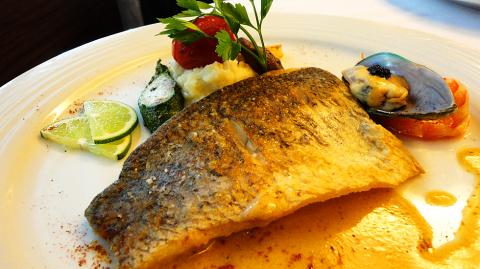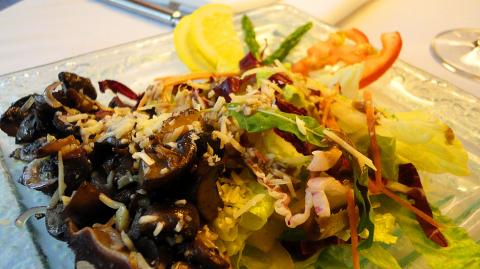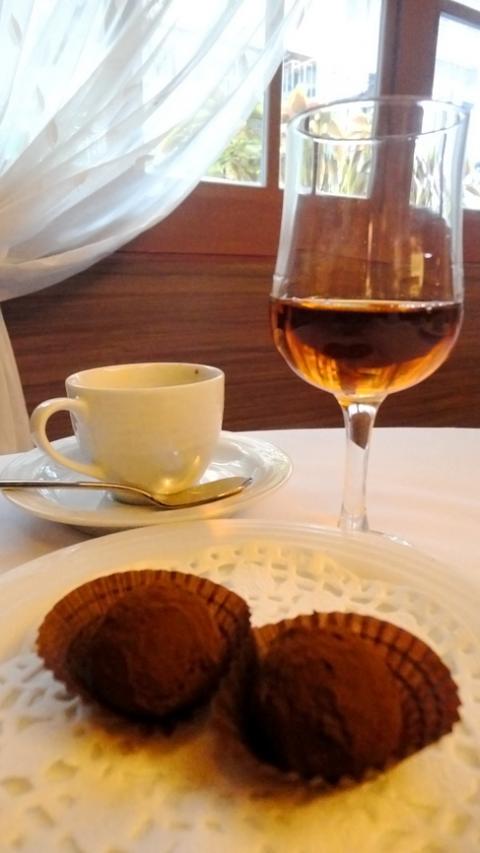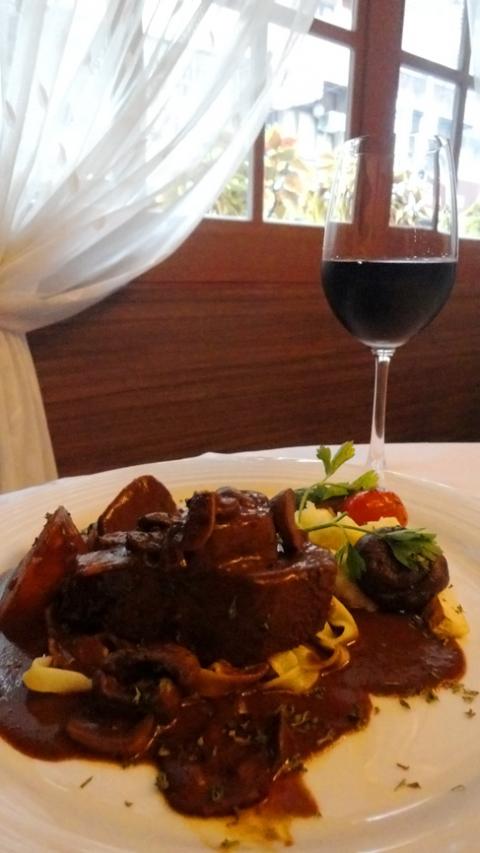On Taipei’s Xingan Street, a restaurant named after Champs sur Marne, a commune in the eastern suburbs of Paris, has been serving elaborate French cuisine for more than seven years.
Aux Champs sur Marne, or Fields upon Marne, offers a gastronomic getaway to Europe. Once diners enter the restaurant, housed in half-timbered walls, the hustle and bustle of the street is left far behind.
My party went to the restaurant on a weekday, and ordered the business lunch menu (NT$720) — a two-course meal that comes with a choice of salad and soup and a main course, or a main course and dessert. Both options include a beverage. For an additional NT$100, you can make it a three-course meal.

Photo: Tang Hsiang-yi, Taipei Times
The fixed-price menu offers plenty of choices. There are salad with bacon and grated Parmesan cheese, salad with Brie cheese or Roquefort cheese, salad with mushrooms sauteed in garlic and salad with smoked salmon. We chose the chef-recommended salad with confit duck gizzards, which arrived with a crusty French bread roll straight from the oven.
The salad looked appealing with its colorful mix of lettuce, asparagus, shredded purple cabbage and carrot, topped with sprinkles of cheese. The confit duck gizzards with mushrooms were aromatic and pleasantly chewy, emitting scents of pepper and red shallots and being set off by a balsamic vinaigrette.
For the main course, we chose pan-fried sea bass with white wine sauce and beef tongue Burgundy style with tagliatelle pasta. Other equally tantalizing options included grilled pork chop with green pepper sauce and balsamic vinegar and seared Hokkaido scallop with cider vinegar cream sauce.

Photo: Tang Hsiang-yi, Taipei Times
The sea bass had a crispy golden skin, and yet its flesh was still juicy and tender. The slightly-buttery and shrimpy sauce didn’t overpower the seafood, but gently enhanced it.
As if the generous portion of the fish wasn’t satisfying enough, a mussel dressed with caviar, mashed potatoes, roasted vegetables like zucchini, tomato and water bamboo shoots came served on the same plate.
Covered in red wine sauce, the braised beef tongue — about 2-centimeters thick — had an extremely soft and smooth texture. As sauce-making is key to haute cuisine, I asked chef and proprietor Frederic Tran about the ingredients in this rich, savory sauce. He told me that it was made from beef broth and a variety of vegetables including celery, onion, mushrooms and garlic scapes. But the crucial element is smoked bacon, which accentuates its meaty flavor.

Photo: Tang Hsiang-yi, Taipei Times
The plate came with tagliatelle, and the same generous portions of vegetables and mashed potatoes as the sea bass.
My stomach was somewhat distended after the main course. Consequently, I only picked at the desert of yogurt-like sour cream with raspberries and caramel cookie crumbs. It’s a refreshingly light treat, neither oversweet nor watery.
Other options for dessert include chocolate fondant cake, creme brulee, crepe with ice cream, and “ile flottante” or floating island — poached meringue floating on a sea of English cream.

Photo: Tang Hsiang-yi, Taipei Times
After the dessert, a cup of coffee came with hand-made chocolate truffle to round out the hearty meal.
If you come for dinner, do so on an empty stomach so as to have room for the full-course meal, which starts with bite-sized hors d’oeuvres. Priced at NT$1,420, the dinner menu offers more choices than lunch — including salad with crab meat fish cake, duck breast with apple confit and mustard and pan-fried salmon with ratatouille.
I have dined at the restaurant several times over the years, mainly for the succulent beef tongue. Tran usually takes the customer’s order on his own and makes recommendations. His menu doesn’t change much, but the quality remains stable, which has resulted in a steady customer base. Reservations are strongly recommended on the weekends.

Photo: Tang Hsiang-yi, Taipei Times

May 18 to May 24 Pastor Yang Hsu’s (楊煦) congregation was shocked upon seeing the land he chose to build his orphanage. It was surrounded by mountains on three sides, and the only way to access it was to cross a river by foot. The soil was poor due to runoff, and large rocks strewn across the plot prevented much from growing. In addition, there was no running water or electricity. But it was all Yang could afford. He and his Indigenous Atayal wife Lin Feng-ying (林鳳英) had already been caring for 24 orphans in their home, and they were in

President William Lai (賴清德) yesterday delivered an address marking the first anniversary of his presidency. In the speech, Lai affirmed Taiwan’s global role in technology, trade and security. He announced economic and national security initiatives, and emphasized democratic values and cross-party cooperation. The following is the full text of his speech: Yesterday, outside of Beida Elementary School in New Taipei City’s Sanxia District (三峽), there was a major traffic accident that, sadly, claimed several lives and resulted in multiple injuries. The Executive Yuan immediately formed a task force, and last night I personally visited the victims in hospital. Central government agencies and the

Australia’s ABC last week published a piece on the recall campaign. The article emphasized the divisions in Taiwanese society and blamed the recall for worsening them. It quotes a supporter of the Taiwan People’s Party (TPP) as saying “I’m 43 years old, born and raised here, and I’ve never seen the country this divided in my entire life.” Apparently, as an adult, she slept through the post-election violence in 2000 and 2004 by the Chinese Nationalist Party (KMT), the veiled coup threats by the military when Chen Shui-bian (陳水扁) became president, the 2006 Red Shirt protests against him ginned up by

As with most of northern Thailand’s Chinese Nationalist Party (KMT) settlements, the village of Arunothai was only given a Thai name once the Thai government began in the 1970s to assert control over the border region and initiate a decades-long process of political integration. The village’s original name, bestowed by its Yunnanese founders when they first settled the valley in the late 1960s, was a Chinese name, Dagudi (大谷地), which literally translates as “a place for threshing rice.” At that time, these village founders did not know how permanent their settlement would be. Most of Arunothai’s first generation were soldiers